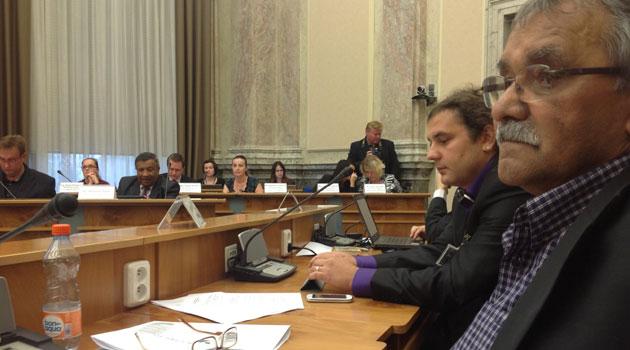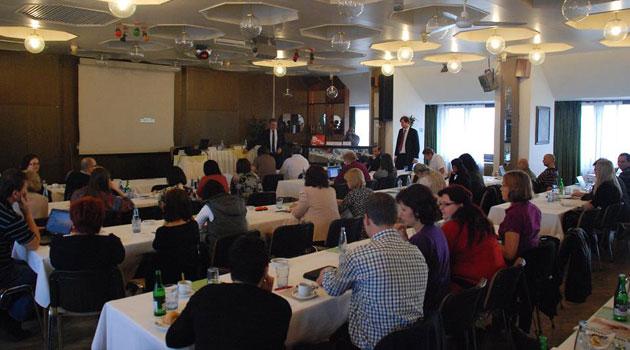Civil society members of Czech Government Council for Roma Minority Affairs recap past three years of work

The civil society members of the Czech Government Council for Roma Minority Affairs (also referred to as the Inter-ministerial Commission for Roma Community Affairs) have recapitulated the Council’s activities during the past three years for news server Romea.cz. Those members see as essential the fact that they enforced the concept of Romani people as a national minority – not as a social group – in the Government’s Roma Integration Strategy to 2020.
In the area of education, the civil society members highlighted their enforcement of inclusive schooling to guarantee Romani children equal access to education. They also mentioned the outcomes of their efforts to secure a dignified memorial at Lety by Písek, which have resulted in a promise to move the pig farm located on that genocide site; news server Romea.cz. publishes in full their statement below.
Czech Government Council for Roma Minority Affairs recapitulates its activity
CIVIL SOCIETY MEMBERS OF THE COUNCIL
- Ján Balog, vice-chair
appointed by Government resolution no. 352 on 12 May 2014 - František Bikár, member
appointed by Government resolution no. 352 on 12 May 2014 - Ing. Karel Holomek, member
appointed by Government resolution no. 352 on 12 May 2014 - Ing. Emil Horvát, member
appointed by Government resolution no. 352 on 12 May 2014 - PhDr. Jana Horváthová, Director, Musuem of Romani Culture, Brno
- Mgr. Lucie Fuková, member
appointed by Government resolution no. 352 on 12 May 2014 - Bc. Martina Horváthová, member
appointed by Government resolution no. 352 on 12 May 2014 - Doc. PhDr. et PhDr. Martin Kaleja, Ph.D., member
appointed by Government resolution no. 352 on 12 May 2014 - PhDr. Renata Köttnerová, member
appointed by Government resolution no. 352 on 12 May 2014 - Mgr. Jan Kudry, Ph.D., member
appointed by Government resolution no. 352 on 12 May 2014 - Bc. Lýdia Poláčková, member
appointed by Government resolution no. 352 on 12 May 2014 - Čeněk Růžička, občanský člen Rady
appointed by Government resolution no. 352 on 12 May 2014 - Bc. Edita Stejskalová, member
appointed by Government resolution no. 352 on 12 May 2014 - Michal Mižigár, member
appointed by Government resolution no. 521 on 8 June 2016
The term in office of the current Council is reaching its final quarter. We, the civil society members of the Council, at the beginning of this last year of our work, would like to recapitulate our activities to date.
We would like to present to the public the following aims that we have achieved. First, we provided comments on the Roma Integration Strategy to 2020, which was approved by the Government in 2015 and emphasizes the national aspect of Romani-related topics over the socal dimension.
In the Strategy, Roma are mentioned as a national minority, not as a social group, which we consider essential. Next, in the area of basic education, we recommended aboltion of the “Mild Mental Disability Appendix” without replacement, and we contributed to pushing for adoption of the amendment to the Education Act that introduced principles of inclusive education into the Czech school system.
We want Romani children to have equal access to education and not to remain in the “practical” schools unnecessarily. We also commented on the Action Plan for Inclusive Education, which was a condition for releasing financing from the European Union to the Czech Republic.
Together with others, we contributed to creating a methodological material for schools to detect and resolve bullying. For the next period of time, in addition to other work, we plan to follow how the introduction of inclusion into the schools has actually impacted Romani children and their parents.
The Czech Government Council for Roma Minority Afairs has also established a mandatory Monitoring Committee for the Czech Government Agency for Social Inclusion. That committee, during this time, has met primarily to choose the localities/municipalities with which the Agency has sought to launch collaborations.
During this time period, e.g., during the first round of applications to the Agency, the Monitoring Committee did not approve collaboration in the so-called Coordinated Approach to Socially Excluded Localities for the municipalty of Vsetín, as the town’s application featured serious deficiencies. During the second wave of applications the Monitoring Committee then did approve Vsetín, which was a topic of media focus.
In this remaining year the Committee is aiming to systematically monitor the work of the Agency in the localities. Also, the Council’s Working Group for Compensation of Roma and Sinti reviewed matters connected both with the financal and moral compensation of Romani people for their suffering during the Nazi era.
That Working Group is striving to see the site of the former concentration camp for Romani people near the municipality of Lety u Písku made more dignified. We have repeately recommended the Government resolve the situation of the remembrance sites at Hodonín u Kunštátu and Lety u Písku, and we have contributed to the political and societal pressure that has resulted in a promise to transfer administration of the remembrance site at Hodonín to the Museum of Romani Culture, and to move the pig farm from the Lety site.
Annually we comment on the financial allocations, focus, and form of the subsidy program for the Prevention of Social Exclusion and the subsidy program for Community Work, an essential program for supporting NGO activity. We also express our views on the form of the subsidy program for field social workers in municipalities and on subsidies to Regional Roma Coordinators.
Representatives of the Czech Government Council for Romani Minority Affairs attended several international conferences and meetings, where they represented the Czech Republic. After the Government failed to adopt draft legislation to compensate the victims of involuntary sterilizations, we initiated further discussion of this topic and we are insisting on more discussions to arrange for compensation to the victims.
We are also following the case of the death of a young Romani man at a pizzeria in Žatec, which has yet to be solved, as well as the development of its investigation. The Czech Interior Minister is a member of the Council, and we have also been asking him about facts connected with crime prevention and hate violence.
We called on figures in Czech public life to consider where they stand in the matter of the Český slavík Mattoni popular music audience appreciation poll giving an award to the controversal music grup Ortel. We also expressed support for the singer Radek Banga (alias Gipsy) for his stand on that issue.
The Czech Government Council for Roma Minority Affairs is an advisory body to the Czech Government. The Council expresses its views on many matters, both current events and long-lasting causes and problems.
The Council is able to adopt recommedations and resolutions. Whether the recommendations are ultimately accepted depends on those to whom they are addressed.
The current Council’s term will end, at the latest, in the autumn of this year. Until then, we intend to continue following the established principles of our work and fulfilling the aims of the activities of our various working groups.
Answers to questions posed to the Czech Government Council for Roma Minority Affairs
1) What is the purpose of the Council?
The current Czech Government Council for Roma Minority Affairs was comprised in 2014 of active Romani figures in public life and representatives of various ministries (most frequently deputy ministers or ministers), as well as a representative of the Museum of Romani Culture, the Office of the Public Defender of Rights, the Union of Cities and Municipalties, the Assocation of Regional Authorities, and the Czech Government Agency for Social Inclusion. Its chair is the Czech Minister for Human Rights and Equal Opportunities.
The purpose of the Council is to represent the interests of Romani people in all spheres of life. However, its role is just an advisory one, and it cannot decide or intervene on its own.
One of the Council’s aims is to create conditions for objective information to be communicated about Romani culture, about the current situation of Romani people, about Romani history, about the Romani minority as a whole, about Romani opinions, and about Romani traditions. Each new Council establishes priority topics for itself that it wants to focus on and addresses them through committees and working groups.
Members of the Council engage in each committee or working group according to their personal interest. Their recommendations are made to cities and municipalities, to the Government, to ministries, and to Regional Authorities, including to the Regional Roma Coordinators.
2) Who are the Council members?
The civil society members of the Council are chosen by the Czech Human Rights Minister and approved by the Czech Government. Work for the Council is absolutely voluntary – all members work free of charge, frequently at the expense of their own income generation or personal free time.
The civil society members of the Council are chosen so as to cover as many possible areas in terms of their expertise and as many regions of the Czech Republic as possible. We have, for example, the first-ever Romani dean as a member of our current Council, several Romani Affairs Coordinators, nonprofit staffers, journalists and media experts, social workers, teachers and industrial experts – the list of members is published on the website of the Czech Government.
3) How does the Council work?
The Council meets regularly, at least four times a year, and an audio recording is made or written minutes are kept of the meeting and posted to www.vlada.cz. Besides sessions of the so-called Grand Council, there are many meetings of the committees and working groups focusing on certain topics included in the Roma Integration Strategy to 2020.
The following committees and working groups are part of the Council:
Committee for Collaboration with Municipalities – this covers topics connected with the issue of how the state administration performs and the powers delegated to local level.
Monitoring Committee of the Czech Government Agency for Social Inclusion – this has the final word on choosing localities to collaborate with the Agency and monitors fulfillment of the Social Inclusion Strategy.
Working Group on the Field of Education – this reviews topics related to addressing bullying, desegregation, establishing a favorable climate in the schools overall, and inclusive education.
Working Group for International Cooperation – this arranges for connections with international organizations such as the EU, the OSCE and the UN.
Working Group on the Topic of Compensation for Illegally Sterilized Romani Women – this group wants to find ways to secure compensation for those persons who have been illegally sterilized.
Working Group on the Compensation of Roma and Sinti – this is a working group that reviews matters related to both the financial and moral recompense of Romani people for their suffering during the Nazi era. It strives to see the locatoin of the former concentration camp for Romani people near the municipality of Lety u Písku become a more dignified place for remembrance.
Media Committee – the ambition of this committee was to change the stance of the Czech media when it comes to their depictions of Romani people and their reporting about events connected to Romani subject matter. The activity of this committee has been muted.
These working bodies produce comments, proposals and recommendations for the Government as a whole or for individual ministries. In addition, the members of the Council are nominated to other working bodies of the Government, such as, for example, commissions on the Operational Programmes financed by EU funds and various advisory groups and expert teams.
